6 Ways to Validate Your Business with a Website
When people think of business websites, they often imagine bold headlines, garish call-to-action buttons, and nonstop pitches designed to convert visitors into customers. But not every business needs a site that sells. You might just need a way to validate your business online.
For government contractors, consultants, and many professional service providers, the website’s job isn’t to close a sale. Instead, it’s intended to validate your business. Before a prospect calls or colleague recommends you, they’re likely doing a quick scan of your online presence. They want to confirm that you’re legitimate, have done this before, and qualified to take on the job.

This matters a lot in government or B2B work, where relationships and various rules fuel decisions. In these instances, your website acts more like a business card than anything else. But that doesn’t make it any less important. In fact, the impression you make in those first few seconds can shape how much trust you earn.
Today, we’ll walk through a few specific ways your website can reinforce your authority, demonstrate credibility, and help you stand out as a serious player in your industry, even if you’re not chasing leads or sales online.
1. Highlight Key Credentials and Certifications
Government agencies and other larger businesses want to see that you’re qualified but also prioritize legitimacy. Before they ever speak to you, they’ll likely look for signs that your business is registered, recognized, and capable of handling the work. That’s why prominently displaying your official credentials is one of the easiest ways to build trust right away.
Make sure your site includes relevant identifiers like your UEI, CAGE Code, and NAICS codes, especially if you’re in the SAM.gov system. These are bureaucratic details, yes, but they’re also the digital shorthand that shows you’re eligible for contracts and familiar with government requirements. A quick reference on your homepage, footer, or a dedicated “Capabilities” section can go a long way.
Also include any professional certifications, security clearances, or industry memberships that back up or prove your qualifications. Whether it’s ISO certifications, minority- or veteran-owned business designations, or affiliations with respected associations, these details help differentiate your business and make it easier for decision-makers to verify your credentials at a glance.
Displaying things like badges, seals, or logos from verified sources give your site more weight. Take the “About Us” page on the EWA website as an example:
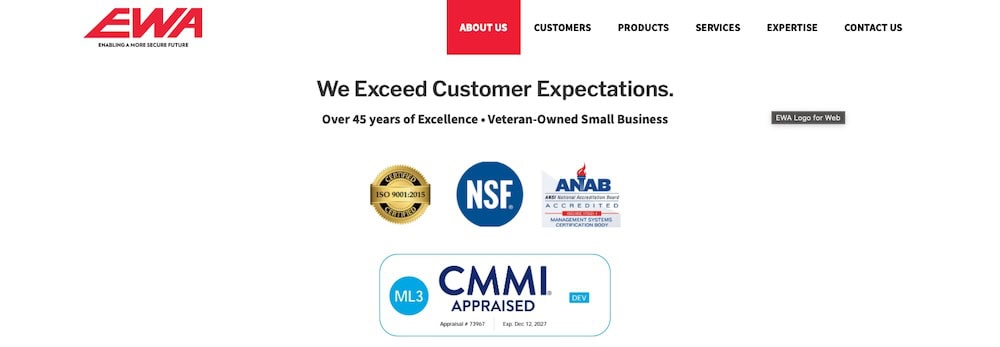
Here, they show certifications for ISO, NSF, ANAB, and CMMI.
2. Summarize Core Services Clearly
When someone lands on your website, they’re usually scanning quickly with their eyes. They’re not reading paragraphs. They’re looking for instant clarity on questions like, “What do you do?”, “What are your skills?”, and “Are you a good fit?”
That’s why your homepage and service pages should skip the vague buzzwords. Ditch “custom solutions” and “strategic support.” Instead, spell it out. Are you a cybersecurity firm for defense contractors? A logistics provider for federal agencies? Say it clearly and upfront.
Break your core offerings into short bullet points or clearly labeled sections. For example:
- IT consulting for government agencies
- Compliance and regulatory training
- Staffing for cleared positions
- Project management under NAICS 541611
Don’t assume people will connect the dots. If you’re in a niche program like 8(a), SDVOSB, or GSA Schedule, call that out too.
The easier you make it for visitors to understand what you do, the easier it is for them to remember you and refer you when the need arises. Not doing these things means missing out on potentially lucrative opportunities.
SyncLayer does a great job at this, displaying the industries they serve and the services they provide right on the homepage.
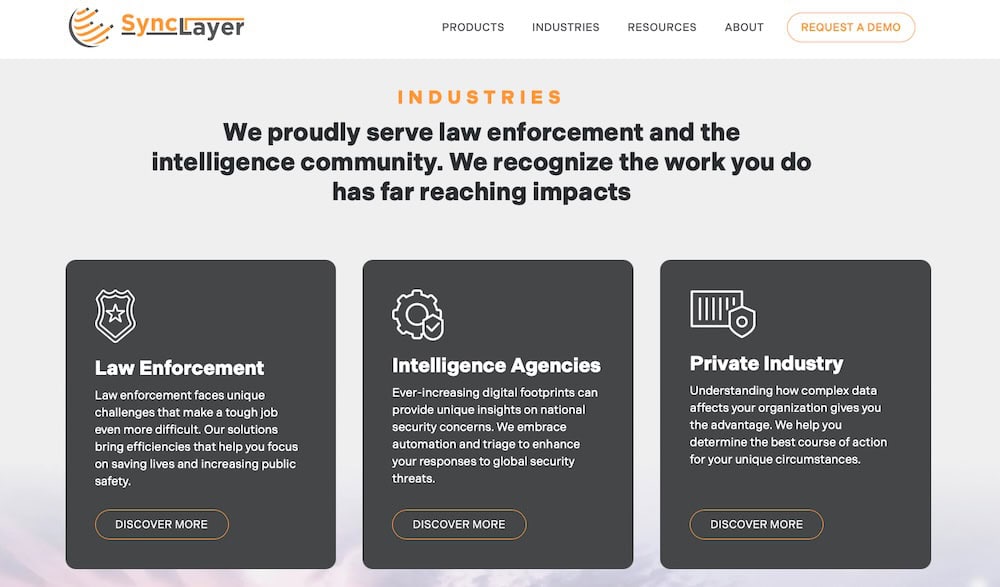
3. Showcase Past Work and Partnerships
Nothing builds confidence like proof. A strong track record speaks louder than any sales pitch. So, when you show real-world experience, especially with recognized agencies or organizations, it tells everyone that others have already trusted you with serious work.
If you’ve worked with government departments, Fortune 500 companies, or respected nonprofits, highlight those relationships prominently on your website. This can be as simple as a clean list of names or logos (used with permission), or a dedicated project portfolio with brief summaries of what you delivered and the outcomes achieved.
Even better, include testimonials or client quotes, particularly from decision-makers or managers at those organizations.
- A “Clients & Partners” section with recognizable logos
- Case studies or project highlights showing past performance
- Quotes from clients that prove you’re reliable
Point 41 Capital Partners has a dedicated Portfolio page to display these relationships:
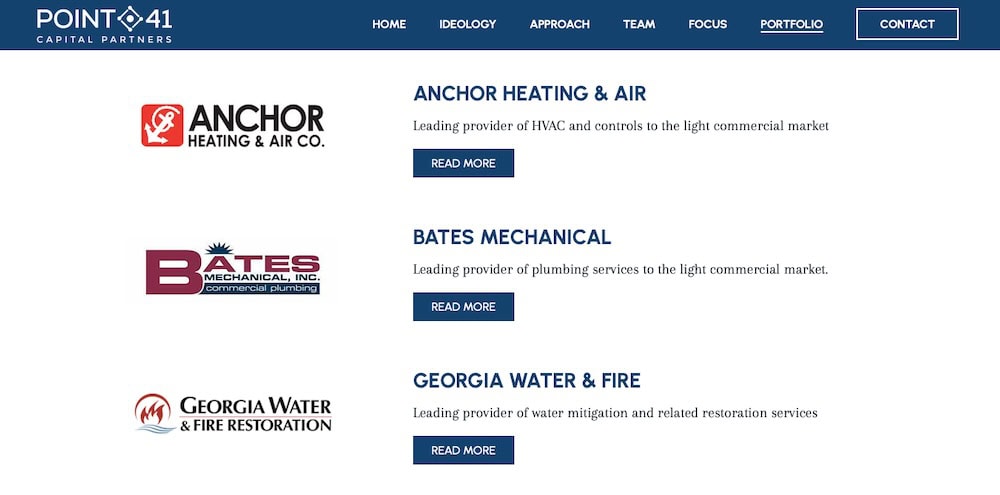
4. Include an “About” Section with Team or Mission
In industries where trust and credibility matter more than clicks and conversions, your About page does a lot of heavy lifting. It’s often the second most-visited page on a professional services website, especially when someone is vetting you for a contract or partnership.
This section should reinforce the expertise, values, and leadership behind your business. It’s your opportunity to put a face (or team) to the name and share the story behind the company.
Start by clearly stating your mission and values. If your work supports national security, public infrastructure, or social impact programs, say so. If you’re veteran-owned, woman-owned, or minority-owned, this is also a good place to mention it.
Next, introduce key leaders or team members. Highlight relevant experience, certifications, and project history.
And don’t forget your years in business, areas of specialization, and the capabilities that make you different.
Carmel & Reyes, a law firm, has a “Who We Are” page that serves this purpose.
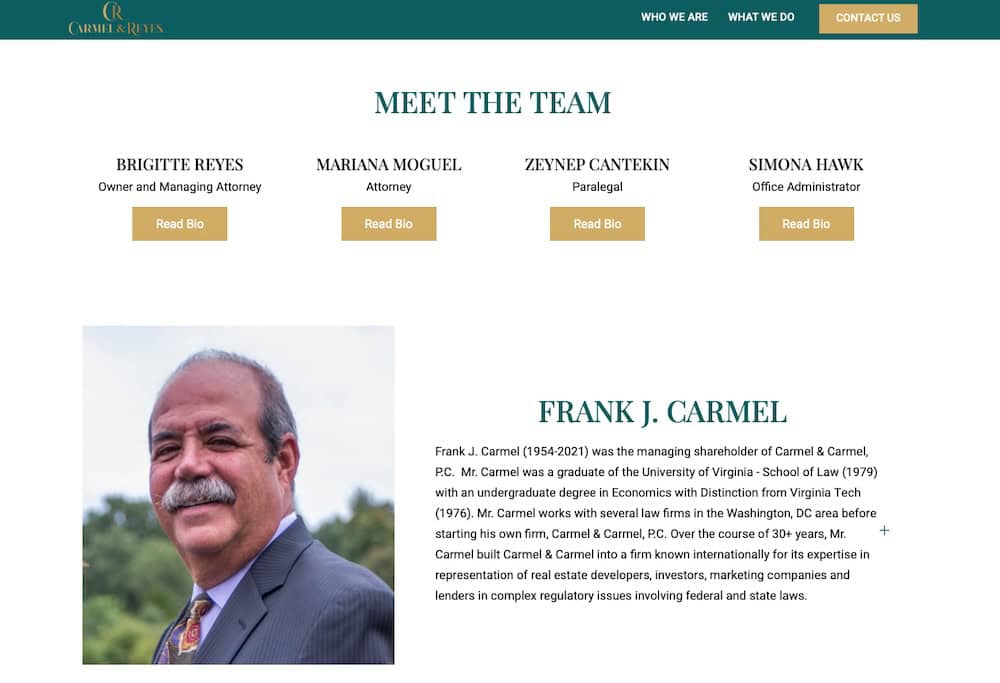
On it, they talk about the firm’s founding and the team behind it.
5. Make It Easy to Get in Touch
Even if your website isn’t designed to generate leads, it should still make it effortless for someone to contact you when the time comes. That is, your contact information should never be hard to find.
At a minimum, display your contact details prominently. Don’t just bury them in the footer. Include a dedicated “Contact” page, and consider adding key info like a phone number, email, business address, and a general inquiry form. If you use a shared inbox or have an admin team handling initial outreach, mention that so expectations are clear.
For more formal contexts, consider offering a downloadable capabilities statement or intro PDF that serves as a one-pager that outlines your services, certifications, and past performance. This makes it easier for government buyers or corporate partners to include you in their vendor databases or consider you for upcoming work.
The EWA website does this well, providing a dedicated contact page with a form, directions, and additional information about their locations.
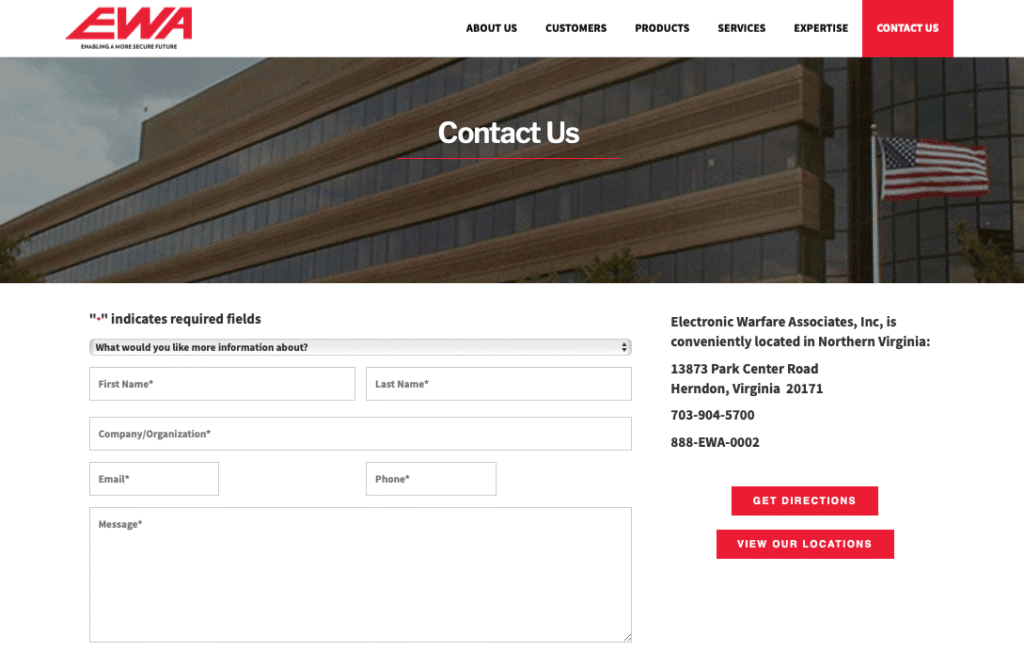
6. Optional but Valuable: Add Supporting Content
Adding content like blog posts or case studies isn’t required, but it can take your site from something like a static brochure to real proof of your expertise. For consultants and contractors in specialized fields, showing that you’re active and informed makes a big difference.
You don’t need to publish constantly. A few evergreen pieces (with relevant images) like how you handle compliance, lessons from recent projects, or updates on industry regulations are enough to show you know your stuff and stay engaged.
Other valuable formats include:
- Case studies that walk through real projects and results
- White papers on industry best practices
- FAQs that help prospects understand how you work
- Brief updates on certifications, team achievements, or new services
Even small touches like these help validate your expertise and make your site feel more credible and current.
Take the Covenant Park website as an example.
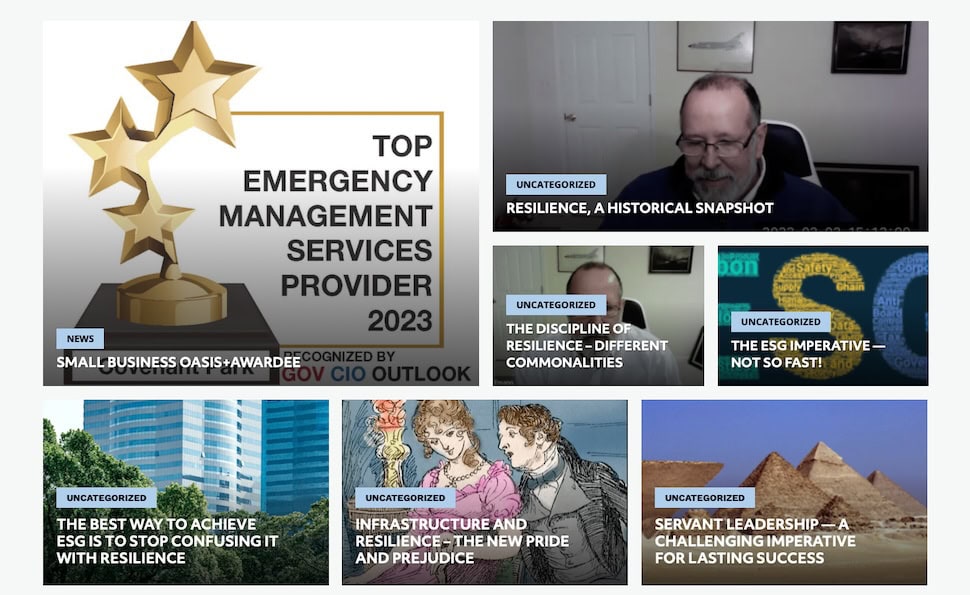
They regularly update their site with the latest news and insights about their industry.
Build Credibility and Validate Your Business Online Now
You don’t need a fancy, sales-focused website to make an impact. For government contractors and consultants, your site’s real job is to prove you’re credible, experienced, and worth trusting.
When you highlight your credentials, showcase your work, and clearly explain what you do, your website becomes a real-time validation tool. That’s what decision-makers are looking for.
If your site isn’t sending the right message, Johnny Flash Productions can help. We build professional websites that strengthen your reputation and position you as a trusted partner.
Let’s build a site that gives your business the credibility it deserves.
Share this post
We focus on beautiful web design that delivers results for your organization. Our specialty is creating customized WordPress websites.
About Us
Johnny Flash Productions
Johnny Flash Productions is a creative agency based outside of Washington D.C. that focuses on digital strategy, web design and development, graphic design and event production that helps businesses get better results from their marketing.
John has been managing my website SEO and Google Ads for only a few months now and his services have already generated profitable leads. I can’t say enough about his company’s professionalism, promptness and results oriented approach. Hiring his company has been an excellent business decision!!

Johnny Flash Productions is a company that truly cares about their clients, this is obvious by not only their work ethic but they also the way they put their heart into every project they complete.
Johnny Flash Productions was a pleasure to work with, we look forward to working with them again in the future.

I was looking for a web designer who was not only talented, but could deliver - and keep delivering what I needed month after month. The team at Johnny Flash Productions brought ideas to the table that complemented what I wanted to do with my website and their design exceeded my expectations.
I was willing to pay more for their continuing monthly service than I had paid previously because they laid out what I could expect from their team. So far, they have under promised and over delivered.

Exceeded all expectations in their abilities to professionally evaluate and customize our company WordPress website. Above all else, their customer service is the best I've dealt with in a long time with any company I've worked with in the past. I definitely recommend Johnny Flash Productions to anyone looking for exceptional service, professional detail and customer support.

I would like to thank Johnny Flash Productions for there great service my company has been able to get to get to the top of Google searches in half the time most companies take. I am now receiving 3 to 5 viable leads a day that all lead to service work for my company. And I can not thank them enough for all of there support with my site and maintaining it for me.

Their knowledge of SEO and integration of social media channels improved our church's online impact.

We had a phenomenal experience working with the Johnny Flash Productions team for our new website, SEO, and logo. We are excited and unequivocally satisfied with the results. Our website has received numerous positive reviews from our clients, associates, and friends. And their SEO services have already brought us new clients who found us online.

We began collaborating with Johnny Flash Productions in January 2023 with the primary goal of optimizing our SEO and achieving visibility on Google's first page. During our initial meeting, John provided thorough explanations and informed us that it could take up to six months to see results. Fast forward, and our company consistently appears on the first page of Google.

I've had an exceptional experience working with Johnny Flesh Productions for my website's search engine optimization. John and his team are not just experts in SEO, but they also make the process engaging and informative. Their prompt responses and unwavering professionalism stand out, making every interaction a pleasure. If you're looking for a team that delivers outstanding results and values client collaboration, Johnny Flash Productions is the go-to choice. Five stars all the way!"

JFP is amazing. My new website is very clean, conveys exactly what I want to my clients, looks way better than the competition, and will be the base for my company moving forward. And now I have a great working relationship with Johnny Flash Productions for all of my SEO and website needs. Don't hesitate to go with JFP, they're honest. They rock!

We began collaborating with Johnny Flash Productions in January 2023 with the primary goal of optimizing our SEO and achieving visibility on Google's first page. During our initial meeting, John provided thorough explanations and informed us that it could take up to six months to see results. Fast forward, and our company consistently appears on the first page of Google. Thanks to John and his exceptional team, our business has doubled. We highly recommend Johnny Flash Productions. Give them a try—you won't be disappointed.
We’ve had the pleasure of working with Johnny Flash for the past couple of years. From designing and managing our website to optimizing our SEO and assisting with marketing efforts, they’ve consistently gone above and beyond. Their team is incredibly knowledgeable, responsive, and dedicated to helping us grow. Whenever we have a question or need support, they’re quick to provide solutions and always offer excellent guidance. We highly recommend Johnny Flash to anyone looking for a professional, reliable, and supportive digital marketing partner.
John and his team consistently knock it out the park for my company. From branding, website creation, SEO optimization, graphic design and the best customer service ever—look no further. Johnny Flash for the win every time!
I have worked with Johnny Flash Productions on 3 of my own websites and recommended them to two other family members who were also in need of new websites. We have all had an exceptional experience during the process. The staff are very responsive, organized, on time and they follow through until the work is complete. We valued them so much that we use them for our monthly maintenance and they help with our advertising online. If you are looking for a website for your company or an edit to your existing company website, this is a company you should check out.






